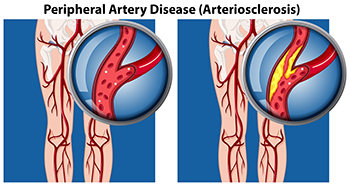

Peripheral artery disease, or PAD, can significantly affect the feet, often causing pain, even during normal activities like walking. This discomfort, medically known as claudication, occurs because of reduced blood flow due to plaque buildup in the arteries. Symptoms of PAD in the feet include cramps, numbness, skin discoloration, temperature changes, and the development of ulcers. These symptoms are concerning because they indicate insufficient blood circulation, which, if untreated, could lead to serious conditions like limb ischemia. In severe cases, this can result in tissue death or even amputation. It is vital for individuals with peripheral artery disease to engage in regular, supervised exercise to improve circulation. A podiatrist can help to manage the effects of PAD by providing specialized foot care, monitoring symptoms, and advising on exercise programs tailored to enhance blood flow. They can also guide patients in footwear choices and care for ulcers to prevent infections. If you have foot problems related to peripheral artery disease, it is suggested that you schedule an appointment with a podiatrist for treatment.
Peripheral artery disease can pose a serious risk to your health. It can increase the risk of stroke and heart attack. If you have symptoms of peripheral artery disease, consult with one of our podiatrists from Grand Blanc Family Footcare. Our doctors will assess your condition and provide you with quality foot and ankle treatment.
Peripheral artery disease (PAD) is when arteries are constricted due to plaque (fatty deposits) build-up. This results in less blood flow to the legs and other extremities. The main cause of PAD is atherosclerosis, in which plaque builds up in the arteries.
Symptoms
Symptoms of PAD include:
It is important to note that a majority of individuals never show any symptoms of PAD.
Diagnosis
While PAD occurs in the legs and arteries, Podiatrists can diagnose PAD. Podiatrists utilize a test called an ankle-brachial index (ABI). An ABI test compares blood pressure in your arm to you ankle to see if any abnormality occurs. Ultrasound and imaging devices may also be used.
Treatment
Fortunately, lifestyle changes such as maintaining a healthy diet, exercising, managing cholesterol and blood sugar levels, and quitting smoking, can all treat PAD. Medications that prevent clots from occurring can be prescribed. Finally, in some cases, surgery may be recommended.
If you have any questions, please feel free to contact our office located in Grand Blanc, MI . We offer the newest diagnostic and treatment technologies for all your foot care needs.